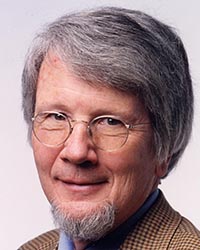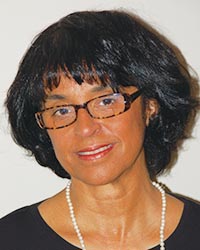Meet the APS Board for 2014–2015
The Observer profiles new leaders of the APS Board for 2014–2015: Nancy Eisenberg, Arizona State University, becomes APS President, C. Randy Gallistel, Rutgers University, joins the Board as President-Elect, and Elizabeth A. Phelps of New York University becomes Immediate Past President. Thomas H. Carr, Sandra Graham, and Mikki Hebl begin their terms as Members at Large. We thank outgoing Immediate Past President Joseph E. Steinmetz of the Ohio State University and outgoing board members Lisa Feldman Barrett of Northeastern University and Susan A. Gelman of the University of Michigan for their leadership and service to APS. We also remember Board Member Varda Shoham, who passed away in March. Shoham is honored by colleagues on page 39 of this issue. View the full 2014–2015 APS Board.
Nancy Eisenberg
 Arizona State University
Arizona State University
President, 2014–2015
Nancy Eisenberg is known internationally for her research on children’s prosocial development and self-regulation. She made pioneering theoretical, empirical, and methodological contributions to the understanding of basic developmental processes. At Arizona State University, where she is a Regents’ Professor, her research interests are self-regulation, socialization and moral and emotional development, socioemotional competence, empathy-related responding, and prosocial behavior.
A driving force in the emergence of the study of children’s prosocial behavior, Eisenberg’s contributions have distinguished prosocial behaviors that differ in motivation and in socioemotional correlates, the relation of parenting to prosocial behavior, and the relation of prosocial behavior to empathy-related responding.
Eisenberg is also a major figure in defining the construct of emotion-related regulation. More than a decade ago, she differentiated between more effortful regulatory processes and less voluntary reactive processes. She has also identified socialization correlates of effortful control and empirically delineated the role of emotion-related self-regulation in sympathy, positive adjustment, and maladjustment.
An APS William James Fellow, Eisenberg was editor of Psychological Bulletin and Child Development Perspectives. She has a record of cutting-edge and socially significant scholarship that has resulted in her being considered among the premier developmental scientists in the world.
She is interested in increasing diversity of participation at APS and diversity of the content in the APS journals and convention. She defines diversity broadly, as pertaining not only to race/ethnicity and sex but also to country of origin and residence (of authors) and area of study (e.g., subdiscipline). She also is interested in fostering the visibility and valuing of behavior and its development in psychological research.
C. Randy Gallistel
 Rutgers University
Rutgers University
President-Elect, 2014–2015
Charles R. (Randy) Gallistel’s theoretical and experimental studies have provided psychology with an elegant computational theory of animal action, learning, and cognition. An APS William James Fellow, his influential research encompasses a wide range of topics. He has brought psychophysical methods to bear on the study of learning and memory, providing insight into underlying neurobiological mechanisms. With the late John Gibbon, he developed a novel theory of classical conditioning. His research has helped define the basic quantitative properties of the neural substrate for brain stimulation reward. With Rochel Gelman, he wrote The Child’s Understanding of Number, a book that has served as the basic source for a generation of studies of numerical reasoning.
A signature of Gallistel’s research is the examination of fundamental issues at several levels of psychological organization. Prime examples are his research on space and time. At the psychophysical level, these studies have revolutionized understanding of the mechanisms that enable animals from wasps to rats to humans to locate themselves and move through space and time. At higher levels, he has provided rich theoretical and experimental insight into how these organisms represent the spatial and temporal structure of the experienced world. Related to this, his work on quantitative reasoning has ranged from probing the neurological bases of quantitative inference in animals to the evolution of numerical representation in the human child. In recent years, this work has extended to the question of how, in the human case, these representations may influence and be influenced by their expression in the languages of the world.
Another important facet of Gallistel’s scholarly contribution has been synthesis and integration. In particular, his books The Organization of Action and The Organization of Learning are syntheses of vast and diverse experimental literatures. These works have been highly influential in scholarly communities ranging from neurophysiology to cognitive science to the philosophy of mind.
Thomas H. Carr
 Michigan State University
Michigan State University
APS Board Member, 2014–2017
Tom Carr’s scientific investigations have addressed perceptual recognition, semantic memory, selective attention, reading, language production, acquisition of knowledge, problem solving, and sensorimotor action. His research focuses on the executive control of complex skills, including how skills are learned; how they are performed in their mature and well-practiced states; whether they are influenced by “choking under pressure” or other kinds of cognitive and motivational stressors; and, as an amateur, the neural substrates of these processes using fMRI.
Carr has come to view knowledge acquisition as a skill and is investigating test-enhanced learning (“the testing effect”). In addition to basic-science investigations, he is interested in the instructional implications of research on skill acquisition. He has collaborated with an aphasiologist to study the behavioral, cognitive, and neural impact of aphasia rehabilitation programs and is now working with professors at Albion College and Kalamazoo College on research about learning in classroom and academic settings.
From 1993 through 1998, Carr served as editor of the Journal of Experimental Psychology: Human Perception and Performance, and from 2003 through 2007 as editor of Perception & Psychophysics (now called Attention, Perception & Psychophysics). He is currently one of the associate editors of Cognitive Psychology, a member of the University of Pittsburgh Learning Research and Development Center’s advisory board, and a member of the advisory board of the Understanding Human Cognition Program at the James S. McDonnell Foundation.
Sandra Graham
University of California, Los Angeles
APS Board Member, 2014–2016
Sandra Graham will serve out the term of Member at Large Varda Shoham, who passed away in March. Graham is a professor in the Human Development and Psychology Program in the Department of Education at the University of California, Los Angeles, and the University of California Presidential Chair in Education and Diversity. She received her BA from Barnard College, an MA in history from Columbia University, and a PhD in education from UCLA. Graham’s major research interests include the study of academic motivation and social development (including peer victimization and aggression) in children of color, with a special emphasis on development in school contexts that vary in racial/ethnic diversity. Her research is supported by the National Institute of Child Health and Human Development. Graham publishes in developmental, social, and educational psychology journals.
Graham is a 2011 recipient of the Distinguished Scientific Contributions to Child Development Award from the Society for Research in Child Development and the 2014 E.L. Thorndike Award for Career Achievement in Educational Psychology from Division 15 (Educational Psychology) of the American Psychological Association. She is as associate editor of American Psychologist and Journal of Research on Adolescence.
Mikki Hebl
 Rice University
Rice University
APS Board Member, 2014–2017
Mikki Hebl is an applied psychologist whose research focuses on workplace discrimination and the barriers stigmatized individuals (e.g., women and ethnic minorities) face in social interactions, the hiring process, business settings, and the medical community. In addition, she addresses ways in which both individuals and organizations might remedy such discrimination.
Hebl is a particularly strong advocate for gender issues and the intersection of gender and leadership. She twice has received Rice University Women’s Resource Center Impact Awards for her commitment to research on gender and service to women in the community. In 2006, she was one of five co-investigators at Rice who received a $3.5 million National Science Foundation grant to advance women in STEM fields at Rice. In 2010 and 2011, she was co-awarded National Institutes of Health grants to examine gender biases in letters of recommendation and successful mentoring relationships.
She is also a Fellow of the Society for Industrial/Organizational Psychology and the Society for Personality and Social Psychology. She has received 15 major teaching awards.





APS regularly opens certain online articles for discussion on our website. Effective February 2021, you must be a logged-in APS member to post comments. By posting a comment, you agree to our Community Guidelines and the display of your profile information, including your name and affiliation. Any opinions, findings, conclusions, or recommendations present in article comments are those of the writers and do not necessarily reflect the views of APS or the article’s author. For more information, please see our Community Guidelines.
Please login with your APS account to comment.